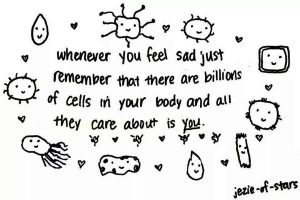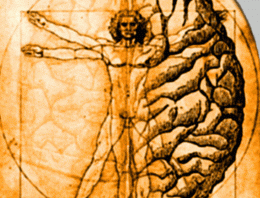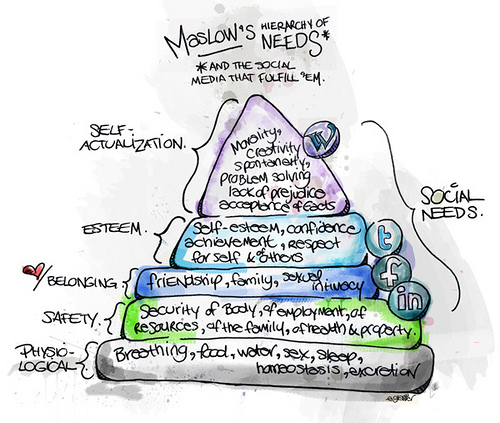Did you know that the first Matrix was designed to be a perfect human world? Where none suffered, where everyone would be happy… But I believe that, as a species, human beings define their reality through suffering and misery. The perfect world was a dream that your primitive cerebrum kept trying to wake up from.
– Agent Smith, The Matrix (1999)
In Saturday’s Guardian, author Jonathan Franzen describes social media as a protection racket and says: Your reputation will be murdered unless you join in this thing that is, in significant part, about murdering reputations… Why would I want to feed that machine?
In contrast, Deepak Chopra defines social media as the extension of our brains, and believes that we are all creating and contributing to the collective unconsciousness, or global brain, every time we Tweet, Facebook, and share online. He says that our brains restructure themselves according to the information we gain, the habits we have, and our skills.
As an embodied human in a social media world, I believe that both realities are true.
The embodied human
Borrowing embodiment.org.uk ‘s view of the human as an iceberg, we get:
- The tip of the iceberg is our everyday awareness and the ‘self’ with which we identify.
- The bit just below the water is our gut feeling.
- And below that in the unfathomable depths, is the deep body of our subconscious. We only tap into this part with meditation or ritual.
This narrow focus on ‘self’ heightens our subjectivity and because our brain interprets new experiences in light of our past experiences including the context in which they occurred known as embodiment (situatedness, or social situatedness), we never have a raw experience. All our experiences are subjective.
This realisation has fascinated humans in the domain of phenomenology for at least a century now. Phenomenology is the study of the structure of experience. Literally, the study of how we make sense of phenomena.
We live in our minds and with the advent of social media, sociologist Sherry Turkle believes that it is changing us. Best-selling author and influencer, Jennifer Weiner in the New York Times, says technology leads to bad behaviour and the dumbing-down of America. And, so is in agreement with Franzen, her nemesis. Myself, I am not so sure, I think social media is reflecting us. Although I have wondered if computers are making us stupid because when we rely on them, we don’t use our minds so much. Whereas social media removes us from where we are and as Weiner points out we behave badly – e.g., ignoring others is rude – because all our attention is given to the communication online.
The social human behind social media
Ultimately, we are social animals, so, it is no surprise that we have adopted social media in order to share our thoughts, feelings, and experiences of the things right in front of us with as many people as we can. However, in the midst of all this sharing, we are hardwired to fight for our survival and protect ourselves from harm. This is part of our brain is called the amagydala, or our inner lizard.
Maslow sums up this social, yet scared, human being brilliantly in his hierarchy of needs with a pyramid. At the bottom are the inner lizard concerns: survival and our physiological needs. The next level is safety. And then comes the need to belong to a community or a family because it gives meaning to our lives. After that comes our esteem need. Humans need to respect themselves and have others respect them in their communities. And lastly comes self-actualization: humans need to realise their potential, and feel fulfilled.
The types of information we share on social media fit exactly into Maslow’s hierarchy, (Maslow’s hierarchy of social media), and savvy content media marketing types know that the lower down the pyramid their product taps a human need, the more likely they are to make a sale.
This kind of thinking and selling horrifies Franzen which is why he says that he would not want to feed that machine. And he has a point. As much as I like Chopra’s idea that we are contributing to the collective unconsciousness, or a big body of knowledge, as originally defined by Jung, a lot of information that gets posted on line is done not deeply after meditative thought, or after being in touch with the deeply submerged depths of our subconscious. Often, posting occurs self-consciously or purposefully like the marketers in order to achieve an end result with other people jumping on board. Franzen’s view then is more mob rule. When people come together and the individual gets submerged beneath crowd or mob psychology, it can be murder.
The human need to please
As humans we are inherently social animals – we need to belong – but also we are trained from birth to give people the behaviour they want or the information they prefer. Dr Caspar Addyman, is researching why we laugh and only uses babies because: Adults are far too complex. They either tell you what you want to hear or try to second-guess you. But if a baby does something it’s bound to be a genuine response.
It is hard though to second guess someone and give someone what they want without the social cues you receive in specific situations in society, when you are just reading text on a screen. Much communication research has tried to remedy communication with or via a computer: facial recognition, speech recognition, and even the invention of the emoticon. We need cues online because our brains contains mirror neurons which enable us to simulate the intentions and feeling behind someone else’s actions in the real world. Is this even possible online when we lack context? Even robots need bodies to be embodied and situated to have a context within which they can navigate the world. Indeed context can get you far even if humans don’t speak a language. As Professor of Sociology Lucy Suchman realised, most interactions in restaurants or supermarkets are scripted and familar because of the context and situation humans find themselves in. We all know the scripts.
Similarly, social computing recreates the social systems we have at work, in teams, and local communities. By accessing the information these organisations generate, the online world becomes familiar and more reliable. One simple example is the review system of products on Amazon or Argos. We are social so we take on board other people’s opinions and feedback, especially those people who are influential, and we may make different decisions based on their recommendation.
But how do influencers become influential? @RStarDinoPirate set herself a goal to blog once a week until one day she wrote a funny, brilliant blog about sexual consent. It went viral and led her to feel that she had to be a voice because she had a crowd of people listening to her. This responsibility made her feel fatigued and put her off blogging until she remembered why she began blogging in the first place. Hurrah that @RStarDinoPirate did, otherwise we may have lost her distinct voice and interesting thoughts.
Learning to listen to yourself in the midst of the social media clamour can be difficult for even the most social media savvy people amongst us. Personal growth expert Steve Pavlina gave up social media altogether because he had become aware of how he would take pictures to share, rather than take the pictures that he wanted to take. It was only then, that he realised, he too, rather like @RStarDinoPirate, was blogging about things he felt he should blog about rather than what was closest to his heart or bubbling up from his subconscious.
The human being not the human doing
We refer to ourselves as human beings not human doings, but in society, our worth has always been measured by what we do and what we have. Online it is the same. How many followers do we have? How many people can we influence? The world is busier and crazier because digital advances have compressed time and space, and we can be online 24/7. This was summed up beautifully by the advice I got last year at the content marketing show: You have 15 minutes to create momentum on Twitter, 1 hour on Facebook, latch onto a world event. Aaargh! Now we have to choose to consciously unplug. But how do we do that?
Jon Kabat-Zinn, Professor of Medicine and Mindfulness advises us to: Find your own way, listen to your own heart, longing, yearning. He says that thinking only takes us so far because this new digital landscape overloads us with facts, not wisdom. Instead we must paying attention to the present moment non-judgmentally. We must be mindful instead of taking life for granted.
Yogis believe that we hold pain and suppressed emotion in our bodies because we have often not paid attention to ourselves in a mindful way. I know this to be true, for when I first began yin yoga, I found that each time I sat in Wide-Angle Seated Forward Bend (Upavistha Konasana) I would become overwhelmed with anger and irritation. The hardest thing for me to do was to stay in that position and accept those feelings. I didn’t want to be there. I wanted to run away. In my less enlightened moments I have checked my Facebook whilst in various poses on my yoga mat because let me tell you, three minutes in Upavistha Konasana can feel like an eternity. With practice, I learnt to accept those feelings until they dissipated and I was left with peace and relief.
We all crave and yearn for a moment of peace and relief outside of time where we allow ourselves to be – a human being not a human doing. Many, like me, turn to social media to find inspiration because meditation and mindful are hard things to do, and hard to sustain. Kabat-Zinn is very practical and says: Instead of trying to sustain it over a day capture it moment by moment many times, be 100% when you pick up your child, cut the carrots, stir the pot, teach yourself to come back to who you actually are… until life becomes the meditation teacher.
Then and only then should we reach out from that place of peace if we want our social media to be an extension of us – or the wiser deeper parts of us – as Chopra believes. Otherwise we may just experience a Franzen-frenzy fear of feeding that machine.








5 comments